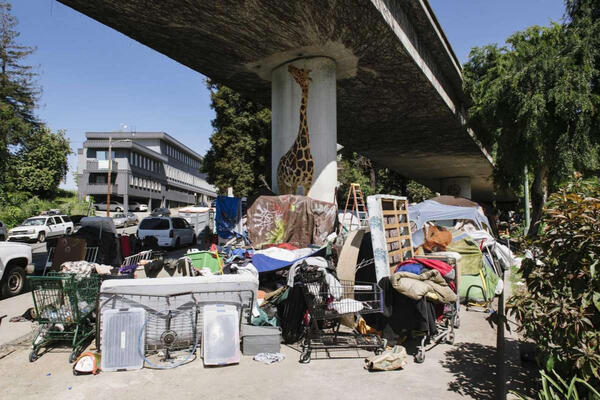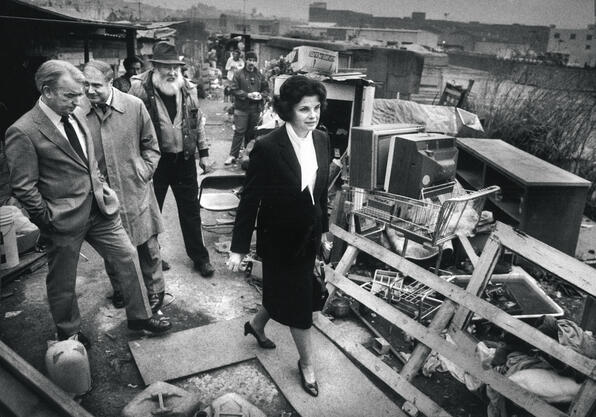homelessness in california
unit 7 culminating project by airis encarnacion
homelessness: exactly what is it and
why should we care?
home·less
/ˈhōmləs/
adjective
(of a person) without a home, and therefore typically living on the streets.
It is a necessity to have safe and stable housing for the wellbeing of all people. Californians make up only 12% of the U.S., yet 27% of people that experience homelessness are in California. 72% of people experiencing homelessness are experiencing unsheltered homelessness, which is also the highest percentage out of any state.
Not only does homelessness impose unsafety and instability for the physcal wellbeing of the people, but it also presents mental instability and trauma to those affected. Some common mental illnesses amongst homeless people include depression, bipolar disorder, schizophrenia, anxiety, and substance abuse. The prevalence of these mental illnesses also creates drawbacks when it comes to earning income/looking for employment.
Almost 28% of homeless people in California are chronically homeless, a term used to describe a period of homelessness for longer than a year.
Homelessness in California affects mostly (but not limited to) Black, Indigenous and other People of Color.
a brief history of homelessness in California
The homelessness epidemic isn't new, nor very surprising for California. The issue has been a common occurrence since the Great Depression. Many in Los Angeles were heavily impacted during World War II, while San Francisco began to see homelessness in the early 80s. After a national recession, housing became harder to attain in both parts of California.
During the 80s in San Francisco, Mayor Feinstein administrated temporary solutions, such as "emergency shelters, soup kitchens, and overnight stays in cheap, private hotels."
The strategy proved to be pretty unsuccessful. Many of the shelters were not properly managed and funded. In turn, homelessness was still a large problem and only continued to increase.
In Los Angeles there was a similar, yet more aggressive approach. At the time, a majority of shelters were private, segregated, poorly run and provided no long-term assistance for those in need. Therefore, neighborhood which became known as Skid Row was inhabited by many homeless people, which the city did not like. They begun to police the homeless and forcibly pushed them out.
The 80s presented an increase in unemployment and housing prices, and Los Angeles became "the homeless capital of America" in 1984.
As of late, efforts to end homelessness have been a little more progressive, but the issue is still prominent throughout California.
Stability is needed in all of our lives to truly succeed. During 2020, we all experienced high levels of instability due to COVID-19. Many of our daily routines were suddenly interrupted. Whether it is financial, housing, or emotional instability, many individuals around the world are still processing the stress of COVID-19.
Children that experience homelessness and unstable conditions are more likely to be exposed to social-emotional and behavior problems in school and life. The lack of consistent and stable housing stunts child development, along with causing "anxiety, depression, sleep problems, withdrawal and aggression," according to research conducted by Child Trends.
Unstable housing is a very liquid term. It is not just caused by homelessness, but can also be caused by natural disasters, divorce, foster housing, etc. Let alone facing the instability of homelessness, facing a worldwide pandemic on top of that causes more stress.
All people, regardless of age, race, and gender deserve stable and consistent housing in their lives.
what is currently being done to address homelessness in California?
as of 2021...
(July 19, 2021) Governer Gavin Newsom signs the "largest funding and reform package for housing and homelessness in California history," as a part of what is called the California Comeback Plan, which was put into place on July 12, 2021. The California Comeback Plan consists of funding towards local governments and programs which move homeless people out of unsafe conditions and into stable housing.
This package provides a $12 billion dollar investment over the span of two years. $5.8 billion of that package provides over 42,000 housing units, with housing provided specifically for those who have mental health challenges, as well.
(September 29, 2021) Newsom once again addresses the homelessness issue, highlighting the increase of "coordination and accountability" of California's homelessness spending. 7 bills were signed, which touched on the following homelessness/mental health issues: safety regulations in homeless shelters, homeless/unaccompanied youth and children, local educational agencies, housing projects, the Homeless Management Information System, and involuntary treatment in terms of mental health. $22 billion is invested to tackle systemic issues, and $12 billion (as stated previously) for homelessness and mental health services.
| INTEREST GROUP | INFO | CONTACT |
|---|---|---|
| Housing California | Housing California is an organization which advocates for a state with affordable housing and healthcare for all people. They work at a state level to prevent and end homelessness and provide stable and permanent affordable housing. Housing California has made it possible for many bills to passed and many policies to be created. They connect and lead a statewide network of people and organizations for a larger impact. | 1107 9th Street, Suit 560, Sacramento, CA 95814 916.447.0503 Iris Murillo, Communications Manager, [email protected] https://www.housingca.org/ |
| Miracle Messages | Founded in 2014, Miracle Messages is a non-profit organization, working to rebuild support systems for homeless people. They do this through reuniting homeless folks with their family, phone-based buddy systems, and a direct cash transfer of $500 per month. They are not solely based in California, but internationally. | 845 Market St., Suite 450, San Francisco, CA 94103. [email protected] 1.800.MISS.YOU https://www.miraclemessages.org/ |

